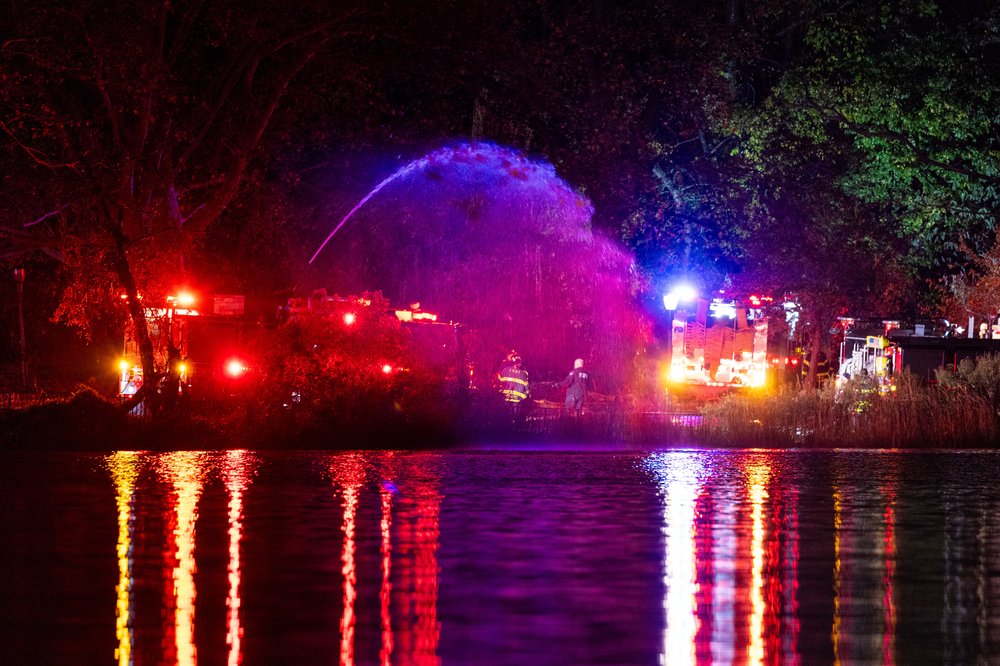FDNY contains 4-acre fire in Manhattan’s Inwood Hill Park, using water from Harlem River
Nov. 14, 2024, 8:26 a.m.
The blaze in the borough’s “most ancient forest” was the latest in a series of brush fires in the metro area amid record drought conditions.

Another week of record-dry weather contributed to yet another brush fire in a beloved New York City Park on Wednesday into Thursday.
Dozens of firefighters responded to a blaze in Inwood Hill Park in Upper Manhattan around 3 p.m. on Wednesday and were met with “very treacherous conditions,” according to FDNY Commissioner Robert Tucker, who said the park’s steep hills made the task more difficult.
To extinguish several different hot spots in the thick forest, firefighters had to climb up 150 feet of elevation with hose lines that pumped water from the Harlem River, FDNY officials said. The department also launched drones to help firefighters navigate the dense brush, and a marine unit also assisted in the response.
Kevin Woods, the FDNY’s assistant chief of operations, said firefighters faced a risk from falling trees in the park.
“We had multiple trees that collapsed — extremely dangerous for our members,” he said at a press conference on Wednesday night.
Wednesday, the #FDNY operated at a 3-alarm brush fire in Inwood Hill Park.
— FDNY (@FDNY) November 14, 2024
“We've been here about four hours fighting a third alarm brush fire. These are very treacherous conditions for our firefighters tonight. We'll be here all night and into tomorrow morning. There are hot… pic.twitter.com/SDzVvEmzrh
The Inwood Hill Park fire was contained just after midnight, with between 3.5 and 4 acres burned, officials said. A total of 140 firefighters and emergency medical personnel worked at the scene.
It was the latest in a series of brush fires in the metro area amid record drought conditions due to sparse rain this fall. Last weekend, a falling tree killed an 18-year-old New York state parks department worker who was responding to a massive forest fire on the border of New York and New Jersey that sent smoky air across the region. And in the city, firefighters tackled multiple blazes, including one in Brooklyn’s Prospect Park that started last Friday and burned 2 acres.
FDNY officials said the causes for all of the recent brush fires in the five boroughs were still under investigation as of Thursday morning. Woods, the assistant chief, said the department has eight brush fire units citywide that train regularly.
The last two weeks have been exceptionally busy for emergency responders deployed to knock down local brush fires. There have been more than 230 brush fires in New York City since Oct. 29, according to data the FDNY released on Wednesday morning — the highest number in a two-week period in city history.
The Bronx led the five boroughs with 67 fires, followed by Queens with 56, Brooklyn with 51, Manhattan with 24 and Staten Island with 17. Those totals do not include the fire in Inwood Hill Park or one at Alley Pond Park in Queens that firefighters were also battling on Wednesday.
Tricia Shimamura, Manhattan borough commissioner for the city parks department, said Inwood Hill Park is considered Manhattan’s “most ancient forest” and a precious space for residents, especially the indigenous Lenape people.
“From its first founding to now, it’s been an essential resource,” Shimamura said.
Tucker, the FDNY commissioner, at the press conference implored New Yorkers once again to take care when walking through the city’s parks.
“Stay on the paths, don't discard cigarettes without making sure that they’re really out,” he said.
Mayor Eric Adams has banned grilling in local parks while the drought conditions continue. Gov. Kathy Hochul has issued a statewide burn ban on outdoor fires started for brush and debris disposal as well as unconstrained campfires and open fires used for cooking.
Fires in NYC parks are common. The drought is making them bigger and more frequent. Dry winds in NY and NJ keep wildfires burning throughout the region Brush fires in Brooklyn, throughout the NYC region bring haze and smoke-tinged air NJ declares drought warning, as water shortages and fires pose a regional threat